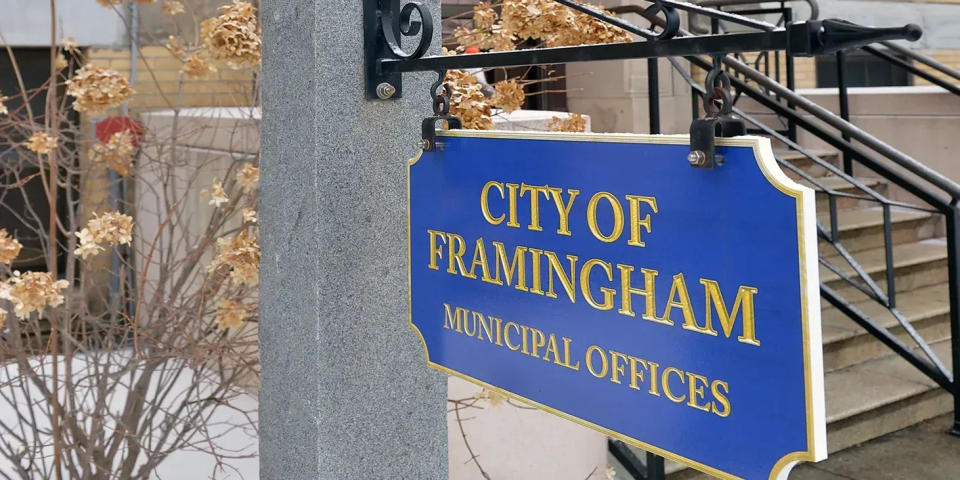Water billing error in Framingham may have flushed millions down the drain, ex-CFO says
FRAMINGHAM — A discrepancy in the billing of certain multi-unit buildings in Framingham has led to potentially millions of dollars in lost revenue, according to Louise Miller, the city's recently departed chief financial officer.
Miller, who resigned as CFO in December, told city officials in a transition memo that Framingham will have to rectify a situation in which approximately 1,500 of the city’s 3,000 multifamily units are being billed for water and sewer rates improperly, according to the city’s billing rate structure.
The discrepancy comes from a distinction between how multi-unit buildings are billed. All Framingham buildings are billed through a tiered system that has buildings paying rates based on the size and scope of water and sewer usage. The more water a property uses, the higher the tier in which it is placed, meaning it pays a higher rate.

CFO resigns: Louise Miller is resigning from her Framingham post effective Dec. 31
“If they are using 200 units of water, their first 10 units would be (billed) at Tier 1, the next 20 units at Tier 2, whatever the rate structure is until they hit the highest tier,” Miller told the Daily News. “In the case of most single-family homes, they are using under 10 units of water per home, so they never really get out of Tier 1.”
In the case of some multifamily buildings, instead of being classified as one high-tier property, they have their rates divided by the number of units in the property. That keeps large-scale buildings that could contain hundreds of condo units in the lowest-paying tier.
Miller says some multi-unit buildings were not billed properly for water
While Miller told the Daily News she could not remember which properties specifically are paying lower rates, she said, as an example, that a 60-unit condo building in Framingham would be billed as if it were 60 separate condo units — all classified as Tier 1 properties due to each unit having realtively low water and sewer usage.
Miller said the key is that this rule is only being applied to about half of all multi-unit buildings in the city, meaning that some multi-unit buildings are appropriately being classified at a higher tier, while others are getting a significant break being classified as Tier 1 properties.

Framingham Mayor Charlie Sisitsky confirmed he was aware that properties are being billed differently and that the city is looking into why this has been going on.
"What happens is, in some cases the water bill, for say Windsor Green, is a huge amount of water, and it’s billed at a higher tier, so they pay a lot more per unit for their water," Sisitsky said. "Some places, and we are still working to find out why, they have what is called a factor — they still have a single meter for the entire complex, but when that reading comes in for a large amount of water, it gets divided by the number of units for a complex, so it comes up with a factor of the average use per unit. They calculate the bill based on that lower number per unit, and that puts them in a lower tier, so they are paying a lower amount per unit. The total amount of water used is divided by the number of units, and there is no rhyme or reason for why that happened. It goes back to the 2000s, when a presentation was made to the Board of Selectmen, and the town has not done enough to address it thoroughly enough."
Water bills 'manipulated at the account level'
In her transition memo, Miller stated that part of the reason the discrepancy was difficult to identify is that water bills have been manually manipulated by somebody with access to city billing accounts.
"This means that, in the past, someone physically set the bills to bill incorrectly,” she said.
Miller said that for the bills to be made incorrectly, a user with access to city software would had to have gone into the system and manually made the adjustment.
“When a water meter is put on the system, it is entered into the billing software," she told the Daily News. "The reason is because we have software that reads the consumption, that consumption goes into MUNIS (a separate civic software system), and MUNIS calculates what the water bill should be. Since the water rates are uniform across the city, in order for a water rate bill to not reflect the total according to the water rate, someone has to enter what is called a multiplier, which takes the total number and sets it to pay a fraction of it. So instead of being billed, let’s say $10,000, they get billed $1,000.”
The adjustment would have to be made for each individual unit in the city, meaning the manual adjustment would have been made approximately 1,500 times to cover every unit that has been part of a multi-unit property that has been paying a reduced rate.

Sisitsky said that while the accounts would have to be adjusted manually through the system, he does not believe someone was intentionally adjusting rates with sinister motivations.
"I don’t know where that is coming from," he said. "I would interpret that to mean that she is talking about the factor. In order to do what I was talking about, changing the bills to divide by the number of units had to be done manually. Someone had to look at the complex, determine how many units are there, divide by the number of units and generate a new bill, and that had to be done by hand. I think that may be what should be referring to."
Miller said that after discovering the discrepancy, she told Sisitsky and said the issue would need to be fixed as part of the upcoming rate setting discussions for the next fiscal year.
“I mentioned it to the mayor in one of our meetings, and what I told him was that we would need to address this, as part of the rate setting that we intended to engage in this spring, for FY25,” Miller said. “We should look into multifamily units and what a proper rate should be, and put everyone on the same rate.”
When asked whether there was going to be an investigation, Sisitsky said the city is focused on making things equitable going forward.
“We are just trying to figure out why that happened," he said. "There is nobody working here that would have been responsible for doing that, and what we are trying to do is look forward, correct it, and make it equitable for everybody."
Councilor King asks whether homes have been grandfathered
George King, chair of the City Council's Finance Subcommittee, expressed concern about the statements Miller made in her memo, adding he wished it was brought to the city's attention earlier.
"I am concerned about these issues," King said. "I am disappointed that our CFO took this long to bring this to our attention."
King, who was Framingham's town manager from 1999 to 2005, said during that time, all multifamily units were billed using the divided-by-units approach, but it changed at some point to no longer apply to larger-scale properties.

"A decision was made for larger apartment buildings, they would no longer be divided," he said. "They would be reserved to be paying under the normal tier structure. In my memory, buildings that were, I believe, four units or less, would still be divided — so a lot of our older two- and three-families were grandfathered in."
King said that if those are the 1,500 units that are benefiting from the factor, there isn't an issue. However, until a full analysis is done to determine which units were receiving the benefit and which were not, the city cannot be sure.
"If the buildings that are four units and under are getting divided, I think that is right," King said. "But if it is one big apartment building getting a break and another one isn't, then that is a serious problem. That definitely has to be analyzed."
Water meter replacement leads to discovery of discrepancy
This is not the first instance where Framingham had unbalanced water and sewer rates. Two years ago, it was discovered that defective water meters were miscalculating water usage. The city began a process to replace those meters, which ultimately led to discovery of the current issue — the discrepancy in multi-unit buildings.
“Roughly six months ago, we replaced a broken meter for a condo complex — the complex got in touch with the city after the replacement and noticed they were being billed differently,” Miller told the Daily News. “After we replaced the water meter, they were being billed at the normal billing structure, and it turned out they had been receiving a discount prior to the meter being replaced.”
'Create balanced budgets': Framingham mayor accepts recommendation to hike water and sewer rates by 16%
Because quarterly water bills for some larger multi-unit buildings can cost hundreds of thousands of dollars, Miller said the lost revenue to Framingham could easily be in the millions. It's not clear to Miller how long the discrepancy has been going on — it could date back to the original construction of the multi-unit buildings.
Sisitsky stressed the city will analyze the issue and adjust the rates.
"If you are talking over 20 years (of lost revenue), it could be in the millions of dollars, if you are talking only a few years, no," he said. "What I’m planning on doing is to continue to upgrade our meter system, continue to train our water meter repair people and we are going to study the tiers and maybe adjust them. We are going to do an analysis, we are going to take different samples of different multifamily buildings, analyze what would happen if you make changes to the tiers. The goal isn’t to raise the rates, but to correct the inequities in how people would get billed."
Mayor addresses issue at council meeting
During a City Council meeting on Jan. 16, District 3 City Councilor Adam Steiner asked Sisitsky if the memo from Miller was accurate in stating that potentially millions of dollars could have been lost through error.
“I’m wondering if this is accurate or this has ended up in revenues that have lost millions of dollars, and that burden has been shifted to the taxpayers?” Steiner asked.
Sisitsky responded that the city isn’t sure, and that the plan is to do an evaluation to make sure that when the new water and sewer rates are set for the next fiscal year, everyone is paying the same rate.
“The plan is to combine how people are billed with the different rates so that when we have the rate hearing in June, we will be able to deal with that,” Sisitsky siad. “The goal is to try and equalize everybody’s water bill so everybody is on the same plane when we set water rates in June. We hope that we won’t have to raise water rates necessarily, but (we want to) make sure everyone is paying equally.”
Sisitsky said the city would hire an outside consultant to evaluate water rates and then recommend the correct course of action for the city.
“We are pretty confident that by June, we will have a solid recommendation and a path going forward with the rates,” the mayor said.
Steiner said he would like to get a spreadsheet that shows all of the buildings in the city that were benefiting from the factor.
“I think it makes the most sense for the Finance Subcommittee to get a full spreadsheet of all the buildings that had the factor applied, because I’m definitely hearing that there are large apartment buildings where it is somewhat arbitrary on whether they are paying (the factor or not),” Steiner said.
This article originally appeared on MetroWest Daily News: Water bill issue may have cost Framingham millions, former CFO claims

